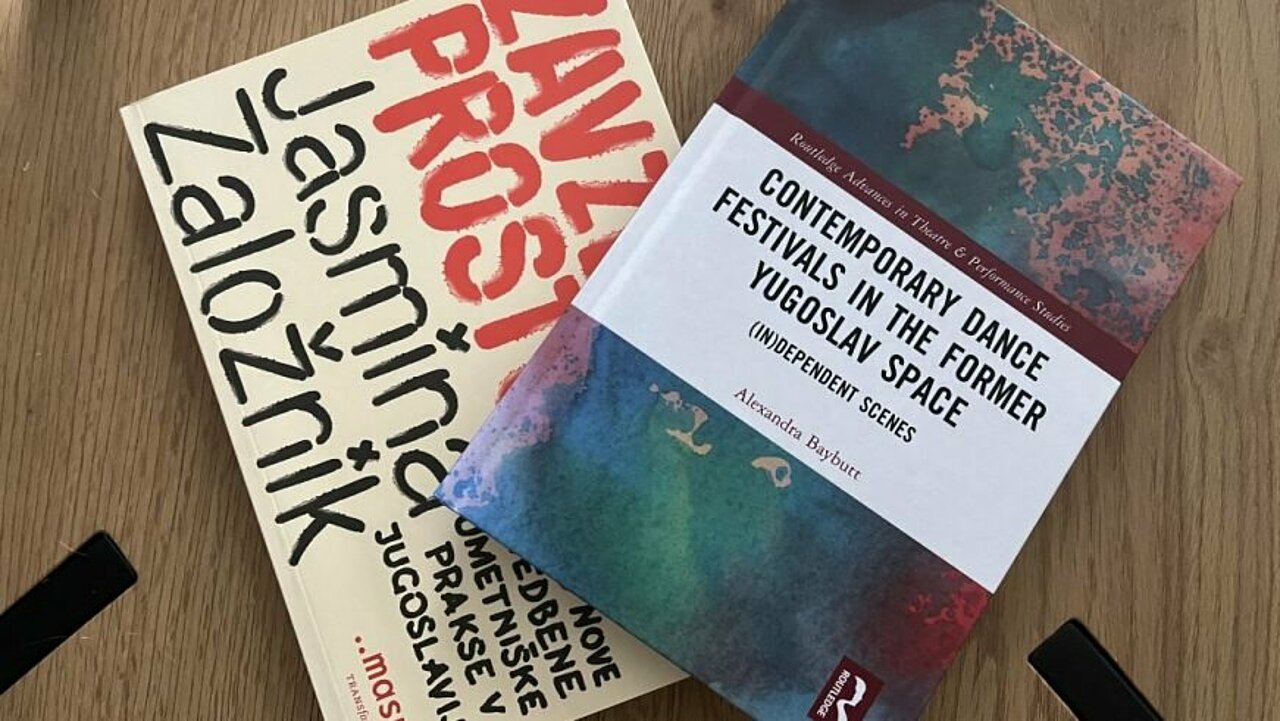Federation of Artistic Actions and Discourse
Book Presentation
Jasmina Založnik – Claiming of Space: New Performative Art Practices in Yugoslavia (published in Slovenian, Maska, 2024)
Alexandra Baybutt – Contemporary Dance Festivals in the Former Yugoslav Space: (In)dependent Scenes (published in English, Routledge, 2023).
Jasmina Založnik analyses »performative art practices« in the period between 1965 and 1987 in Yugoslavia, focusing on Ljubljana, Novi Sad and Belgrade. »Performative art practices« are those practices that dealt with and emerged from the body – they reconstructed the understanding of the body and explored its »(re)presentations, uses and thoughts.« Založnik’s book studies the artists from former Yugoslavia, male and female, who had been active from 1965 onwards and had used their art practice to move away from the conventional understanding of artwork. These artists no longer felt the nostalgia for post-WW2 revolutionary achievements. Rather, they had been encouraged by the Yugoslavian youth world view, so they wanted to speak up about their problems and manifest the processes of Yugoslav self-management in their organisations.
Alexandra Baybutt’s book focuses on festival-making connected with the Balkan regional network Nomad Dance Academy, and highlights collective approaches to sustain a theorisation of festivals using the concepts of dissensus and imperceptible politics. Through anthropological methods, she studies three specific festivals, namely PLESkavica (Slovenia), Kondenz (Serbia) and LocoMotion (North Macedonia). She provides an analysis of social, political and historic orientations influencing the curatorial practices.
Saturday, 23 November, 18:30 at +MSUM – Seminar
Free entrance!

»We are beings of human origin…«
Discussion
This year, the CoFestival curatorial team drew inspiration from the following sentence: »We are beings of human origin …« In 1983, the late Novi Sad-based poet and neo-avant-garde artist Vujica Rešin Tucić stated in his book Hladno čelo (Cold Forehead): “Unacceptance of the world of humans is not a non-human trait. Nor is it human. It is an important trait of those who see and understand the world in anticipation of changes.” Further on, he clarified: “I see myself as a being of human origin, as someone else, as a being that differs from other humans as a man differs from the apes. And I can tell you, I am not alone. There are already many such beings of human origin in our country. This is burdensome. We live in a big concentration camp, we move only for short distances, watch a very limited number of TV programmes, we read but a few newspapers, and have no money to try and cross the border … But a certain humankind that we no longer belong to still lives on the other side. We have all been kidnapped, regardless of our numbers. We have been kidnapped by the kidnappees. This prison needs to be torn down.”
The phrase »beings of human origin…« is a kind of guideline for viewing this year’s CoFestival programme. It can suggest many things. It suggests difference, not identity. A departure from the perception of what is already represented and a shift to the perception of stage presences, human things that have yet to be identified, named, reflected upon and sharpened in the senses and thoughts. It suggests critical perception in which bodies are manifested, so as to find out how actions are performed in altered conditions and environments. It suggests a change that has already manifested in us, however, we have yet to perceive it, gaze at it, reflect on it. It suggests the fact that we live in a time period in which the structures and experiences of public time have altered. Consequently, we have great trouble with imagining the future and incorporating the past into our self-narratives. Perhaps we need to invent another way of recounting about ourselves, to include everything to which we may feel aversion. What kind of languages make something like this possible? Dramaturge Igor Dobričić will discuss many possible suggestions with members of the CoFestival curatorial team Rok Vevar and Dragana Alfirević.
Thursday, 28 November, 20:00, at Kino Šiška, upper foyer
Free Entrance!